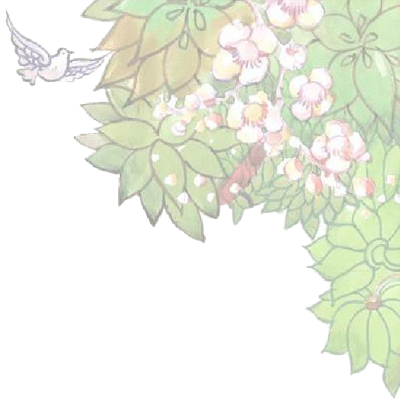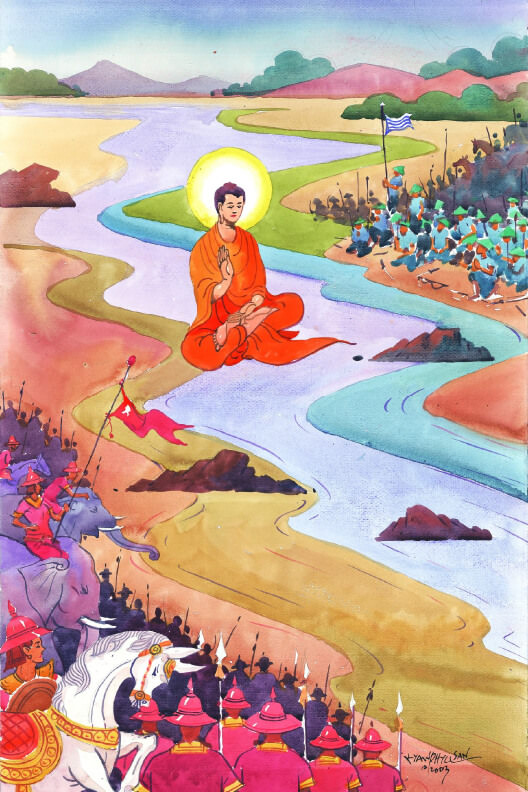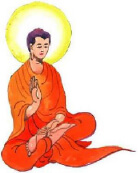37話 ローヒニー川の水戦争

第4部 ブッダをめぐる人々
第1章 さまざまな男たち
37話 ローヒニー川の水戦争

サーキャ国(釈迦国)とコーリヤ国は、ローヒニー川という小さな川で隔てられていた。(訳注:釈迦族とコーリヤ族は祖先が同じで、両国はローヒニー川をはさんで隣接、西に釈迦族、東にコーリヤ族の国があった。シッダッタ王子時代のヤソーダラー妃はコーリヤ族出身だった)川の両側の人びとは、農業の耕作に川の水を利用した。川をまたぐ堰がつくられ、それによって水を平等に利用していた。
しかしながら、ジェッタ月(訳注:現代暦では5月中ごろから6月中ごろ)のあるとき、川の水位が下限にまで達し、農作物に十分な水が得られなかった。両国は水の配分問題を議論するため、会議を開いた。
その席で、コーリヤ国の農民が、こう述べた。
「友人たちよ、ローヒニー川の水がいま、とても限られております。もし水を分けあえば、われわれの誰も田んぼに十分な水を得られない。しかし、友人たちよ、われらの作物はいまや実ろうとしている。そして、われらの見積もりでは、あともうちょっと水を注いで灌漑すれば実が成熟するには十分だろうと見ているのです。だから、あなた方に、この限られた水をわれらが利用する許可をもとめたい」
釈迦国の農民が、こう答えた。
「友人たちよ、われらの作物もまた、実ろうとしている、ということをご理解いただきたい。そしてまた、実が成熟するには水が必要なのです。さもないと、われらは作物を収穫できないでしょう。もし、あなた方が水を全部使ったら、きっと十分に収穫を楽しめることでしょう。しかし、われらはどうなりますか? われらはあなた方の家の一軒一軒に、お米をもとめて籠とお金をもって行く、なんていうことはできません。その一方で、あなた方みんな、米蔵にお米を十分蓄えて、楽に暮らせるのですよ」
穏やかで協調的な雰囲気で始まった会議は、双方の議論によって沸騰した。お互いに主張し、罵倒し、それを言い返して、やりやった。誰も折れようとはしなかった。言葉のやりとりだったのが、最後には手が出て、殴り合いになった。一方のひとりが攻撃しはじめると、他方が同じようにやり返す。敵意がふくらんで、双方の王の氏族の出自を罵るまでになった。
それぞれの国に帰って、釈迦族の農民代表とコーリヤ族の農民代表が、それぞれこの件について自国の農業大臣に報告した。それから、国会議員に持ちこまれ、国の懸案となった。最終的には両国は戦うために、戦争の準備をしたのである。
そのころ、世尊はサーヴァッティの祇園(ジェータヴァナ)精舎に住まわれていた。朝早く、全世界を仏眼で見渡されて、釈迦族とコーリヤ族間の血なまぐさい戦争が一触即発の危機にある、とご覧になられた。この戦争は両国にとって悪い影響を与えるだけである、と見られて、世尊は互いが殺し合って血の川になるのを防ぐために戦場へ趣かれた。
敵対する両国軍はローヒニー川の水際の戦場へ進軍しており、世尊がそこに到着したのは夕方だった。ローヒニー川をはさんで対峙する両国軍の真ん中の川の上空で、足を組んで坐られた世尊が、頭髪から暗い青の光線を放射すると、日はまだ落ちていないのに辺りに暗闇が広がった。この異様な現象を見て、川の両岸にいた全軍勢はあっけにとられ、驚き脅えた。そのとき世尊は、身体から六色の光線を放って、みずからの姿をかれらにはっきり見せられたのである。
釈迦族が世尊を見たとき、話し合って、このように決めた。「世尊のおられる前でコーリヤ族の人たちの身体に武器で襲いかかるのは、われらにふさわしくない。コーリヤ族の人たちが望むのであれば、われらを殺すなり捕まえるなり、させてやろう」
それから釈迦族の軍隊は武器をすべて捨て、世尊に敬意をこめて坐り、礼拝した。
コーリヤ族も釈迦族と同様に決めた。コーリヤ族の軍隊も武器を捨て、世尊に敬意をこめて坐った。そのとき世尊は空中から降下され、ブッダの慈悲と威光をそなえた特別の席に坐られた。
世尊が、こう尋ねられた。
「ローヒニー川の水と、大地と、どっちがより貴重な価値のあるものですか?」
「ローヒニー川の水は、大地に比べて価値の小さなものです、尊い方よ」
と、かれらは答えた。
「それでは、王(カッティヤ)族の価値はどうですか?」と、世尊がつづけられた。
「高貴な王(カッティヤ)族の価値は計り知れないものです、尊い方よ」と、かれらは答えた。
そのとき世尊が、こう語りかけられた。
「もしそうであるなら、ローヒニー川の流れの、価値の小さい、いくらかの水のために、なぜあなたたちは互いに戦って、価値の計り知れない高貴な王(カッティヤ)族を滅ぼそうと望んでいるのですか? 役に立たぬ戦闘とむだな衝突では、ほんのわずかな喜びすらも見つかりませんよ」
その後すぐに、世尊は「パンダナ樹本生(ジャータカ)」(ジャータカ475)、「物音(ドゥッドゥバ)本生」(ジャータカ322)、「ウズラ(ラトゥキカ)本生」(ジャータカ357)、「ルッカダンマ本生」(ジャータカ74)、「和合(サンモーダマーナ)本生」(ジャータカ33)、「武器を執ること(アッタダンダ)(執杖(しゅうじょう))経(スッタ)」(スッタニパータ第4章15)を次々に続けて物語られた。かれらはみずからの愚かさを思い知った。最後には和解した。愚かな戦争を回避できた感謝を示すために、釈迦族とコーリヤ族はそれぞれ二百五十人の王子を世尊のもとへ送り、比丘として入団させた。それから世尊は、かれらをカピラヴァットゥの近くの大林(マハーヴァナ)へ連れて行った。かれらは「クナーラ本生(ジャータカ)」(ジャータカ536)を聴いた後すぐに聖者への階梯の最初の段階(預流(ソーターパッティ))に達した。さらに、「大集会経(マハーサマヤ スッタ)」(長部20)を聴いて、その終わりには阿羅漢になった。
※ 画像やテキストの無断使用はご遠慮ください。/ All rights reserved.

EPISODE 37 BATTLE FOR THE WATER OF Rohiṇī
The Sākya Kingdom and the Koliya Kingdom were separated by a small river called Rohiṇī. People on both sides used the water to cultivate their fields. A dam was constructed across the river so they could use the water equally.
However, once in the month of Jeṭṭha (about mid May – mid June), the water level reached its lowest, and their crops did not get enough water. The two countries called for a meeting to discuss the matter of water sharing. At the meeting, the Koliyan farmers said: “Friends, the water of the Rohiṇī River is very limited now; if it were shared, none of us would get enough to water our fields. But friends, our crops are about to ripen now, and we have estimated that one more flood of water would be adequate to bring our crops to maturity. So, we would like to ask for your permission to let us use this limited water.”
The Sākyan farmers replied: “Friends, let yourselves know that our crops are also about to ripen, and they also need water to mature; otherwise, we would not harvest our crops. If you use all the water, you will surely enjoy your harvest well, but how about us? We cannot go from door to door of your houses carrying baskets and money in search of paddies, while you all can live in ease because you have enough paddies in your rice barn.”
The meeting, which started in peace and harmony, was heated by arguments from both sides. They argued, abused, and retorted one another; none of them were going to give in. Exchange of words eventually led to blows; a farmer of one side started to attack a farmer from the other side, and the latter retaliated in the same manner. Resentment grew among them to the extent of decrying the royal clans of both sides.
Going home to their respective places, the chief of the Sākyan farmers and the chief of the Koliyan farmers reported this matter to their own ministers of agriculture. Then, when this case was brought to members of parliaments, it became a state affair. In the end, both kingdoms prepared to wage war against each other.
At that time, the Blessed One was residing at the Jetavana Monastery in Sāvatthi. In the early morning, when surveying the whole world with His Buddha-Eye, He perceived that a bloody battle was imminent between the Sākyans and the Koliyans. Knowing that the war would only give bad effect to both kingdoms, He proceeded to the battlefield to prevent them from killing each other.
The two rival armies had marched to the battlefield beside the Rohiṇī River when the Blessed One arrived there in the evening. Sitting cross-legged in the sky over the Rohiṇī River in the middle of the rival armies, He emitted dark blue rays from His hair so that darkness prevailed all over even though the sun had not yet set. Seeing the unusual phenomena, all the armies standing on both sides of the river were shocked and terrified. Then, Blessed One emanated rays of six colours from His body and made Himself clearly seen by them.
When the Sākyans saw the Blessed One, they discussed among themselves and decided: “It is not proper for us to let our weapons fall upon the bodies of the Koliyans in the presence of the Blessed One. Let the Koliyans kill us or capture us, should they desire to do so.” Then, the Sākyan army abandoned all their weapons and sat down respectfully paying homage to the Blessed One.
The Koliyans came to the same decision as the Sākyans. They also abandoned their weapons and sat down paying obeisance to the Blessed One. Then, the Blessed One descended from the sky and sat down on a reserved seat, with all the grace and glory of a Buddha.
The Blessed One asked: “Which is of more priceless value, the water of this Rohiõã River or the earth?”
They replied: “The water of the Rohiõã River is of small value compared to the earth, Lord.”
The Blessed One continued: “Then, how would you value the Khattiya race?”
“The value of the noble royal Khattiya race is unlimited, Lord,” they replied.
Then, the Blessed One addressed: “If that is so, for some water of this Rohiṇī stream, small in value, why do you wish to destroy the priceless royal race of Khattiya by fighting one another? Not the slightest amount of pleasure could be found in worthless conflicts and wasteful strives.”
Thereafter, the Blessed One related the Phandana Jātaka, the Duddubha Jātaka, the Laṭukika Jātaka, the Rukkhadhamma Jātaka, the Sammodamāna Jātaka, and the Attadaṇḍa Sutta consecutively to them. They realised their folly. Finally, they were reconciled. To show their gratitude, the Sākyans and the Koliyans sent two hundred and fifty princes from their respective families to the Blessed One to be ordained as bhikkhus. Then, the Blessed One took them to the Great Forest (Mahāvana) near Kapilavatthu. They soon attained the first stage of sainthood (Sotāpatti) after listening to the Kuṇāla Jātaka; they became Arahants at the end of the Mahāsamaya Sutta.
※ 画像やテキストの無断使用はご遠慮ください。/ All rights reserved.
アシン・クサラダンマ長老
1966年11月21日、インドネシア中部のジャワ州テマングン生まれ。中国系インドネシア人。テマングンは近くに3000メートル級の山々が聳え、山々に囲まれた小さな町。世界遺産のボロブドゥール寺院やディエン高原など観光地にも2,3時間で行ける比較的涼しい土地という。インドネシア・バンドゥンのパラヤンガン大学経済学部(経営学専攻)卒業後、首都ジャカルタのプラセトエイヤ・モレヤ経済ビジネス・スクールで財政学を修め、修士号を取得して卒業後、2年弱、民間企業勤務。1998年インドネシア・テーラワーダ(上座)仏教サンガで沙弥出家し、見習い僧に。詳しく見る
奥田 昭則
1949年徳島県生まれ。日本テーラワーダ仏教協会会員。東京大学仏文科卒。毎日新聞記者として奈良、広島、神戸の各支局、大阪本社の社会部、学芸部、神戸支局編集委員などを経て大阪本社編集局編集委員。1982年の1年間米国の地方紙で研修遊学。2017年ミャンマーに渡り、比丘出家。詳しく見る

※ 画像やテキストの無断使用はご遠慮ください。
All rights reserved.

